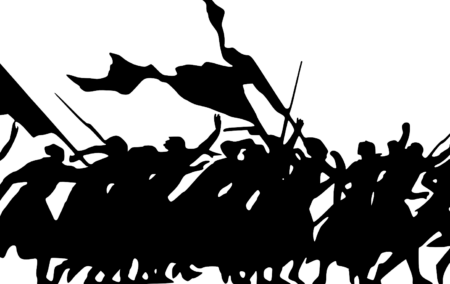An ideology, religious or political, is a doctrine giving expression to a set of coherent ideas and beliefs that claims both to represent the objective truth and to be dedicated to attaining the highest moral good.
Despite these noble claims, in order to attain the objectives for which they are actually created, all ideologies share two questionable basic characteristics.
FIrstly, they are designed specifically to exploit the common human feeling that life, as it is normally lived, lacks real meaning or significance.
Secondly, to then gratify this emotional need, they offer an alternative vision of an ideal, future human existence that will provide people with the desired meaning and significance, as soon as that vision is finally realised, through the application of their dogma.
The identifying hallmark of ideologies is their initial public declaration that a particular state of affairs on earth is morally unacceptable, followed by the presentation of a utopian solution to the perceived problem.
As a religious ideology, Christianity offers sinful humanity holy redemption and the glorious prospect of life after death, provided that its dogma is obeyed. As secular ideologies, Socialism and Communism offer morally imperfect humanity just and perfect social systems here on earth, provided their dogmas are obeyed. Fascism in Nazi Germany offered Germans the vision of a pure, Arian society, free of all racial ‘contamination’, provided its racial dogma was obeyed.
For their own ends
The objective of the psychologically astute individuals who create ideologies, such as Paul of Tarsus, Saint-Simon, Marx, Lenin, Mao, and Hitler, is to be able to control or modify the behaviour of others, for their own ends. To be able to achieve this successfully, however, and have people accept their novel ideology as credible and preferable to the old, existing dominant ideology, they require an effective agency.
For ideologies, this agency is always morality, because morality, as the means by which human society controls the individual beliefs and behaviour of its members, is the only way that ideologues are able to gain the moral authority required to influence people and have them willingly accept what they should believe and how they should behave.
Throughout human history, ideologies have been the way the dominant minority in each society has effectively controlled the credulous and acquiescent majority. This is what ideologies exist for. The emotional need in so many humans to have meaning or significance imparted to their lives (perhaps those individuals who do not attempt to formulate their own philosophy) has provided a consistent public need for ideology. Until the development of the scientific method in the 16th-century, this invariably took a religious form.
Ideologues accordingly always base the ideology that they create upon their local society’s moral code, to which they add novel moral injunctions that specifically vindicate their ideology. In this regard, morality has proved much more efficient and cost-effective as the agency of mass control than physical violence.
In order to gain the moral authority required to be able successfully to tell people what to believe, religious ideologies will claim divine revelation as the source of their moral authority. In secular communities, where belief in the existence of the supernatural is no longer credible, ideologies will nevertheless imply that there still exists an objective, moral truth in the universe, superior to humanity, and that morality is not simply subjective and relative human moral opinion.
Secular claim
This seemingly secular claim that morality is objective and universal, however, relies no less on the supernatural for its universal moral authority, but the claim is made by implication, rather than openly. In this regard, socialism and communism are effectively religions, appropriately secularised for an industrial era.
Apart from the two defining ideological characteristics detailed above, there are others that ideologies also inevitably share. Among these is their authoritarian nature. Because they all claim or imply access to an objective truth, they do not tolerate any opinion that questions their version of that truth.
They are also anti-democratic, insofar as their authoritarian nature belies the fundamental democratic concept of actual moral equality. And because they claim to be dedicated to attaining the highest moral truth, they insist on defining exactly what that supposed objective truth is, and what belief and behaviour is consistent with it.
The single exception to the abovementioned description of ideologies is Liberal Democracy, formulated in 18th and 19th-century Europe and the United States. This anti-authoritarian, highly civilised, and common-sense ideology is the source of the extraordinary freedom and material prosperity that the West has enjoyed for approximately 200 years.
While it similarly claims to be dedicated to attaining the highest moral good, as all ideologies do, most relevantly it does not claim to represent a supposedly objective and universal truth, which as noted, is a supernatural concept originating in the religious ideologies. The truth that it claims to represent is the secular truth, founded on the scientific method, common to the West and originating in the European Enlightenment.
Liberal democracy was both an extraordinary phenomenon and an anomaly in human history. Until its advent, the mass of people on earth had always been controlled and exploited by the dominant minority of the population.
Historical bondage
Liberal democracy actually did for the majority what socialism and communism fraudulently promise to do; it freed them from their historical bondage to the dominant minority, and put them in a position to freely exploit and personally benefit from their individual talents and capabilities.
The current uninformed but mounting criticism and antipathy towards liberal democracy by the liberated majority, facilitated by its intellectual controllers with a promised woke utopia for the seemingly disadvantaged, may however, be indicative of a return to the old, primitive, but perhaps biologically most appropriate way for human primate society to organise itself. Humanity is seemingly lost, if not told what to believe.
[Image: Clker-Free-Vector-Images from Pixabay]
The views of the writer are not necessarily the views of the Daily Friend or the IRR.
If you like what you have just read, support the Daily Friend

